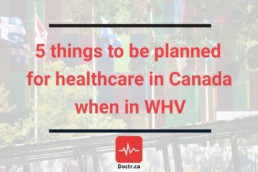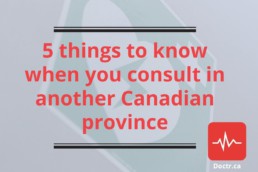Prepare your next sample
You had a consultation with a doctor who prescribed a sample to you. Sample are a common extraction of fluids for a laboratory analysis. This article shows you where you can go take it, and the procedure to follow.
Sample collection form request
When your health professional will explain that you will need a sample test, he will certainly give you a sample collection form request. It is a paper detailing the necessary tests to be completed, whether it is blood, urine or stool test.
Before taking the sample
You may have to follow some preparatory procedures for your sample the day before or a few hours before the test. Several blood samplings must be made fasten, so make sure you read carefully your form request. It is also possible to discuss the matter with your Doctor or to contact 811 in case of doubt. You can still drink water before, it is even recommended. However, do not take your medication the morning of the test, unless your health professional says otherwise.
Choice of places with a sample service
You have access to a plurality of places that offers that service. First you have CLSC’s that propose this service free of charge when you present your Health Insurance Card. Blood tests can also be taken in some pharmacies with charges. You can also go with private companies that offers laboratory analysis services and with the companies that do sampling at home. Private or with charges services are often the ones with the less waiting time.
What you must bring the day of the sample collection?
When you will go for your tests, be sure to have with you your sample collection form request and your Health Insurance Card to be sure to have the service free of charge where it is possible.
They will provide the sampling container needed at your arrival. In some cases, you can ask for a sampling container and make it home before bringing it back. This applies to urine samplings. However, you must keep the sample fresh and provide it the morning you give it for analysis.
Samples are not a procedure for witch you should worried. If you have issues facing the pain or a fear of needles, speak to your doctor or to a pharmacist. There is a cream that desensitizes the area before the sampling. It is available at the desk of pharmacies after a discussion with the health professional.
5 things to be planned for healthcare in Canada when in WHV
The steps to come to Canada for the time of a working holiday visa are pretty long. Even when you are in the host country, there is a whole world to understand. The culture, transports, the health system… This article will provide you from falling into the Quebecer health system traps who can really put you in trouble!
1. Public or private insurance?
Only a few European countries have an equivalence deal on the social security. However, in a WHV, you must contract a private insurance. Before making your choice, shop for the right company and the coverage to maximize the services offered regarding the cost. You must have a proof of insurance in your entrance to the country.
2. Read attentively your insurance contract
Insurance contracts differs from one company to the other and can contain bad surprises. Take the time to read it so you can distinguish what is covered from what is not. It is also important to understand the modalities of your insurance coverage. It is best to know forward if you have a franchise to pay or if you will have to pay the fees first and then ask the insurance company for a refund. You could also be subject to a limit of the covered amount.
3. keep your receipts when visiting the E.R.
Some insurance companies can require that the client pays the fees and then do a claim to get a refund. In that case, you will need the originals or copies of your receipts for your health problems. It is also possible that the company demand to be advise forward to a visit at the E.R. so they can open a claim file. Whatever your case, if you have health related fees keep some written traces of them with the detail of the care receive and their cost.
4. Favor private clinics
For people that are not covered by the public regiment, it is strongly suggest going to clinics instead of the E.R. The costs that will be charged to you in a private clinic will be much inferior to the fees imputable at the E.R. In a hospital, you will have to pay not only for the care and the exams you receive, but also for the administrative fees of the establishment. Besides, the waiting time in private clinics is lesser!
5. Get informed before you need medical care
The best way to save time and money is to get information on procedures and the functioning of the health system. It is not when you will need medical attention that you will be at your best to analyze information. Better be prepared before!
5 things to know when you consult in another Canadian province
Your taking vacation out of the Quebec province and you have prepared weeks in advance. However, some contingencies are uncontrollable. If, during a trip you need health care, you’ll be more informed with this list.
1. Your health insurance card should be following you everywhere.
If you go in a clinic or to the office of a health professional, present right away your health insurance card. Some professionals accept the card, so you can receive the needed treatments without having anything to pay. They are directly remunerated by the Quebec Health Insurance Plan (RAMQ) with whom they sometimes take agreements. For hospitals, there’s an interprovince agreement which gives you the access to the same measures as in Quebec with the public plan card.
2. keep all your receipts.
In the case where your health insurance card is of no use when you need healthcare, you will need some documents. Be sure to have the originals of the receipts you will get. If you make payments with your credit card, keep a copy of the payment slip. When it is made by paycheck, save a picture of each sides of it with the professional’s or the establishment name. In brief, keep all the documents that details the interventions, the received services and their price. This will give you the opportunity to reclaim them to the RAMQ.
3. Get inform on your coverage.
The health insurance card does not cover every charge you could have in a health-related incident. It is giving you the same limited coverage as in Quebec. You are only covered with the doctors, dentists and optometrists. Any other healthcare is not insured and what is covered is in the precise beacons and in the same fees as in Quebec. If you spend more, the fees are at your charge.
4. Do not forget about your medication.
If you take prescribed medication, bring enough for the duration of your trip. You can consult your pharmacist before your leaving to obtain the needed quantity for period of your absence. Medicines, prescribed or not, bought out of the province of Quebec, is not covered by the Quebec Health Insurance Plan.
5. Prevent the worse.
Before leaving, get a private insurance. You will be more reassured that you will not have surprise fees that you will have to pay on the spot. Or else you could at least get them reimbursed quickly.

